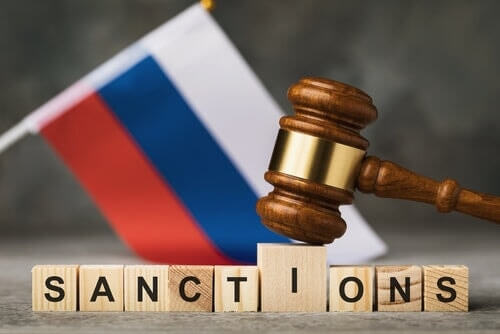
Unstoppable Legal Industry Amid Sanctions (Part 1)
Close on the heels of the Russian invasion of Ukraine early this year, international sanctions came nipping hard and bans were imposed. Popularly dubbed the “Superbowl of Sanctions”, it impacted virtually every sector, corporations and service providers alike, prompting Russia-based international law firms to drumroll public announcements about winding down their operations and exiting the country. In this frenzied flurry of activity, we saw much decoupling, some coupling and, a fair game of musical chairs.
According to an April 2022 article by Reuters, AmLaw firms quitting Russia include:
- Squire Patton Boggs, White & Case and others announced that they would shutter operations and quit Russia.
- Akin Gump Strauss Hauer & Feld LLP, founded by Robert Strauss, the last U.S. Ambassador to the Soviet Union and the first U.S. Ambassador to the Russian Federation, stated that it was “suspending operations in Moscow pending further developments.”
- Baker McKenzie, the first global law firm to enter Russia during the Soviet era, announced a spin-off of its 33-year-old Russia practice and stated: “The intention is for the newly independent firm to be Baker McKenzie’s preferred law firm in Russia.”
- Dentons announced that its offices would operate as an independent law firm. On the other hand, after 17 years in Russia, DLP Piper transferred its Russian clientele to its local employees and withdrew. These firms created independent local firms to continue as their Russia outposts.
With no surprise leading UK law firms including Magic Circle firms issued public announcements about their intentions to close up and ship out.
- Linklaters, the first to announce, pledged to help its Russian employees “transfer to new roles within Linklaters or otherwise”.
- Clifford Chance’s Moscow managing partner established her firm, Bortkevicha & Partners and inducted the majority of the existing Moscow team. In contrast, another team relocated to Düsseldorf to ‘become integrated into the Clifford Chance global network’.
- Eversheds Sutherland transferred its Russia operation to a newly-established independent firm, Birch Legal, which retained all of the firm’s lawyers and support staff in the region and is to act as its ‘relationship firm’ in Moscow.
- Other UK firms, including Norton Rose, Freshfields, Allen & Ovary and Herbert Smith all announced exit from Russia.
EU firms also joined in on the Russia retreat beat: Dutch firm Houthoff pledged to “terminate its relationship with the Russian Federation as well as with associated persons and companies’’, despite stating on its firm website that prior work done on behalf of the Russian state earned it ‘The American Lawyer Global Dispute of the Year Award 2017’ and the ‘Most Important Published Decision Award’ from the Global Arbitration Review.
Swedish firm Mannheimer Swartling stopped its work with Russian clients and relocated its Moscow-based Swedish lawyers, while GAR reported that prominent Dutch practitioner Albert Jan van den Berg ceased acting for Russia.
Dirty Job – Somebody’s got to do it
Legal services fall in the category of “essential services” in most jurisdictions. Moreover, the “right to a lawyer” being a fundamental right, makes legal services exempt from sanctions and bans. But despite that and perhaps especially despite it, there was a mass exodus from Russia by international law firms.
Interestingly, there is a non-uniformity in the floodgates of sanctions unleashed on Russia by the U.S., UK and the EU. According to a Thomson Reuters white paper titled “Fog of sanctions”, the Russia sanctions lack clarity and cooperation amongst the issuing nations.
In the UK, the government announced a ban on services exports to Russia, which included management consulting, accounting and public relations. Notably, legal services were absent from the list.
James Cartlidge, under-secretary to the UK Secretary of State for Justice, in response to a query in parliament about steps undertaken to ensure that UK-based law firms do not contravene Government policies supporting the Russian state, stated that “Legal services are distinct from other services in the role they play in supporting a flourishing democracy and upholding the rule of law.” Mr. Cartlidge also underlined the importance of the legal sector and stated, “The legal sector is critical to the operation of an effective sanctions regime and law firms have a responsibility to protect the reputation of their profession and the integrity of our legal system”.
In the British Virginia Island, Justice Adrian Jack of the Eastern Caribbean Supreme Court delivered a trailblazing judgment when local firm Ogier applied to the Court for recusal from representing a sanctioned Russian client. He ruled: “[T]here is nothing in the sanctions legislation to support an inference that the denial of a right to participate in litigation was intended.” Adding that “even pariahs have rights”, he further stated that " a legal practitioner’s duty as officers of the Court requires them to maintain the rule of law by ensuring access to the Courts for the proper and fair determination of parties’ rights and obligations.”
The Russian exits, therefore, seem an anomaly. Moral and ethical concerns do not form the sole basis for winding up business operations. Nor can it be touted as ‘herd mentality’. If rendering legal services is not banned, disengagement with Russia isn’t mandatory.
Curious to understand how the clock ticked for these law firms, we examined the underlying reasons behind this mass Russia exodus.
While there has been a “Superbowl of Sanctions”, it will be right to say that the legal industry is always prepared for the worst. In our forthcoming article, we will try to find answers to the unknowns - THE WAY AHEAD.
Also read top viewed Ai Legal article: The Role of AI in Legal Research.






